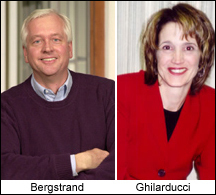
On the heels of the Federal Reserve announcing Wednesday (June 30) its widely expected 0.25-percentage-point increase in interest rates, a University of Notre Dame economist said the U.S. economy is going strong and should get stronger.p. In alluding to the rate increase, first-quarter economic growth of 3.9 percent and the addition of 248,000 jobs in May, Jeffrey Bergstrand said:None of this comes as a surprise. The combination of four factors has boosted growth – and likely continued growth – this year and into next.p. Factors contributing to the robust economy, according to Bergstrand, are:
- Short-term interest rates have made the real cost of short-term borrowing effectively zero.In fact,he said,even with the quarter-point rise, the short term real interest rate is negative – spurring continued demand.
- The Bush administrations tax cuts last year, and maintained this year, haveadded to effective real disposable incoming, spurring demand.
- The weakness of the dollar.This is spurring demand from abroad, and curbing imports a little,he said.The weak dollar is also reflecting the looming budget deficits.
- The transfer of sovereignty to Iraq isalleviating uncertainty about the global economic and world oil outlook, which has assuaged pessimism.p. Bergstrand, a professor of finance and business economics, added that he believes the economy will grow by about 4 percent this year.p. A less optimistic view is held by another Notre Dame economist, Teresa Ghilarducci, associate professor of economics and policy studies and director of the Universitys Higgins Labor Research Center.p. Ghilarducci saidreal economic growth has not met expectations,noting that the 3.9 percent first-quarter growth was short of the prediction of 4.4 percent, and that the inflation rate was 3.5 percent for gross domestic purchases, higher than the estimated 3.3 percent. She cited the trade imbalance, falling dollar and deficit as key reasons for what some economists are calling poorer than expected performances.p. Ghilarducci also noted that, for the average American,real wages have fallen so far in 2004, which is another way of saying that consumer price inflation has outpaced average wage growth. Hourly wages for non-supervisory workers rose 2.2 percent, while the consumer price index rose 3.1 percent.p. The Feds answer to inflation – raising interest rates – is avery blunt and stupid tool of economic policy,Ghilarducci said.p. The rate hike will theoretically slow the economy, which will increase unemployment, which, in turn, will curb wages and then prices. In the end, however, Ghilarducci says, the Feds action will onlyhurt working families.p. _Contact: Jeffrey Bergstrand is available for interviews at 574-631-6761 or bergstrand.1@nd.edu ; Teresa Ghilarducci is available at 574-631-7581 or ghilarducci.1@nd.edu _
TopicID: 5822